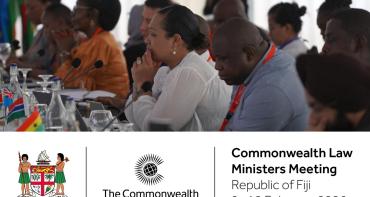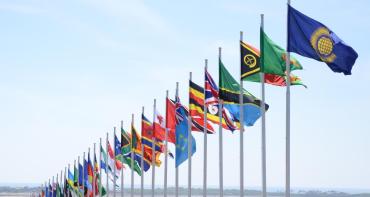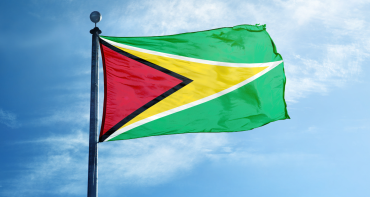Speaker: Commonwealth Secretary-General Kamalesh Sharma
Introduction
Distinguished parliamentarians, eminent guests, I thank the Commonwealth Parliamentary Association, its Chair, Sir Alan Haselhurst, and its Secretary-General, Dr William Shija, for kindly inviting me to be here with you.
I also thank our host, the Speaker of the Parliament of Sri Lanka, the Hon Chamal Rajapaksa. I congratulate him for the excellent arrangements for this conference, and for the spectacular show last evening.
The CPA is a vital component in the global architecture of the Commonwealth and an indispensable partner working alongside the Secretariat in our shared mission of advancing Commonwealth values, with democracy, development and respect for diversity foremost among them.
Indeed with the CPA having celebrated its 100th anniversary last year, and the modern Commonwealth itself now being well over sixty years old, we can truly claim to be travelling companions on a very long journey.
Parliaments lie at the heart of democracy and are held in uniquely high esteem by the Commonwealth. And the CPA helps draw together all that is best from these organs of representative democracy from across the Commonwealth family.
The vast wealth and breadth of experience convened by the CPA never fails to impress - more than 16,000 members from 170 parliaments in 52 Commonwealth countries; it is a truly phenomenal grouping.
Your members represent national and provincial assemblies, unitary and federal states, vast states and tiny ones - and the CPA enables them to connect, interact and deepen understanding of their respective roles and responsibilities as representatives of the people.
An outstanding feature of the Commonwealth as a community is its capacity to convene and connect, bringing people and institutions together to share experience, helping each other for mutual and collective benefit. This is the essence of the CPA and of the Commonwealth as a whole; it always has been and always will be.
Her Majesty The Queen, of course, summed it up best when she called the Commonwealth, “the original worldwide web”!
It is this spirit, this benefit, which, I believe, is integral to what the Commonwealth can do and what it can continue to be in future.
I am also delighted to be in Sri Lanka, a country where civilisation stretches back to ancient times, a vibrant parliamentary democracy since independence, a melting pot of religions, ethnicities and culture, a country that is known for the warmth of its welcome and hospitality.
Sri Lanka holds a special place as one of only three emerging sovereign states amongst the small total of eight that in 1949 came together as signatories of the London Declaration marking the foundation of the modern Commonwealth. And we are pleased that Sri Lanka will also host our next Heads of Government Meeting next year. Both this conference and the Heads’ summit in 2013 offer opportunities for Sri Lanka to make an important contribution to the Commonwealth and the world beyond.
This country has seen many years of painful and traumatic civil conflict. Its overcoming the forces of terrorism is a major achievement. We believe Sri Lanka recognises that, having won the war, it is now important to build the peace. We welcome the steps being taken to implement recommendations of the Lessons Learnt and Reconciliation Commission, through a National Action Plan.
I have had discussions with the Minister of External Affairs and others this week on how Sri Lanka is promoting post-conflict reconciliation and rehabilitation, and am grateful to be received by President Rajapaksa tomorrow. I hope also to see for myself some of the important work the Commonwealth has been requested to do, in partnership with Sri Lanka, to promote youth entrepreneurship in conflict-affected areas.
Sri Lanka knows that the Commonwealth is a willing and able partner, with a wealth of experience to share wherever this might be welcome. Hosting the Commonwealth Parliamentary Conference as well as next year’s CHOGM is a signal honour and trust for Sri Lanka.
Value of Commonwealth Parliaments
Parliaments and parliamentarians embody the culture of democracy in a country. Legitimacy is derived from the freely expressed will of the people through national parliaments, state assemblies and local councils that, in turn, serve the people by holding the executive to account and by ensuring democracy delivers for all.
We often speak of the globalising world in which we live. This heightens our awareness that while the standard of living for many is being raised, too many are still being left behind. The global context within which the Commonwealth strives for the advancement of all remains one in which the gap between rich and poor is enormous and, in too many instances, continues to grow.
‘Democracy’ and ‘development’ were often referred to as the twin pillars of our work at the Commonwealth Secretariat, with each inseparably combining with the other as we seek to deliver the benefits of both for the common good. To these, we now add ‘diversity’, also a hallmark feature and Commonwealth value – equality for all in our populations.
This symmetry is important: for stable and sustainable progress to be achieved, it is necessary for democracy and development and respect for diversity to be advanced together, never pressing ahead with one to the detriment of the others. They reinforce each other, sustain each other, and each person needs them all.
All our Commonwealth Parliaments, and all members of our family of Commonwealth organisations, must continue to strive in particular to build positively on the richness and potential of our diversity, and avoid our differences becoming a source of sterility let alone division. That is the Commonwealth way, and it is a way of working that can be challenging but must be nurtured at all times. Our responsibility as leaders and representatives is to model strength and harmony in diversity to our own members and to the wider world.
We have now worked with the CPA for many years on a series of ‘Government and Opposition’ workshops. These aim to foster a more constructive relationship between governing and opposition parties, one which is conducive to working together within a democratic framework, that places harmony, the communal good and inclusive development above partisan considerations – vital though party loyalties and policy are if there is to be a genuine democratic choice for the electorate and a robust public debate.
Our most recent workshop in this series brought together representatives of governing and opposition parties in East Africa. This builds upon similar events in Asia, West Africa, the Pacific, Southern Africa and the Caribbean.
Parliament should be the primary forum where the voice of the people, especially the poor and marginalised, is heard with absolute clarity. Confidence amongst the people that parliament truly understands, and is able to address the needs and interests of the people, is a paramount guarantee of social peace and stability.
Such confidence can only really be secured if parliamentarians – of both the majority and minority parties – can show their effectiveness in leading free and unfettered public debate; in representing the interests and concerns of their constituents; in holding the government to account; and in scrutinising, improving, and enacting legislation. This is the supreme Commonwealth value – the Parliament is where the heart of democracy beats.
These CPA conferences therefore remain as important as ever – particularly as we see a growing sense of impatience and heightened ambition among young people for the opportunity of making a contribution to shaping the world in which they will live, learn, work and care for their families.
In a Commonwealth that now encompasses 54 countries, 2 billion people and a multitude of faiths, races, cultures and traditions it is remarkable, and a tribute to our methods of working together on a basis of trust and consensus, that we have found common ground on core values and principles and continue to cooperate on collective practical action across such a broad range of issues.
Conference Theme - Ensuring a Relevant Commonwealth for the Future
Your conference theme is “Ensuring a Relevant Commonwealth for the Future”. This is a topic on which we should constantly reflect, and indeed over recent months and years it has been assessed and commented on by a whole range of stakeholders, from citizens at the grass roots level to an Eminent Persons Group to Heads of Government.
It is not that the Commonwealth is irrelevant. But wide consideration of this topic, including by this conference, is right and proper because the challenges facing us in the world today are as immense as they are broad, and are attended equally by opportunities. It is by evolving, refining and strengthening the focus of our engagement that we can hope to succeed in finding solutions and serving our member states.
In the 2009 Affirmation of Commonwealth Values and Principles, adopted by our Heads of Government, they reiterated their commitment to democracy as a core value. And they reaffirmed their commitment, I quote, to:
“… the inalienable right of the individual to participate by means of free and democratic political processes in shaping the society in which they live.”
Unquote.
The promotion of democratic values, alongside development and diversity, thus remains a principal focus of the Commonwealth. It is our ‘USP’, our brand strength, a fount of our continued relevance.
Commonwealth Ministerial Action Group
The Commonwealth Ministerial Action Group acts as the custodian of the Commonwealth’s fundamental core political values and, since its establishment in 1995, it has been addressing situations where serious or persistent violations of those values have occurred.
As such, CMAG has supported the strengthening of democracy in member countries and its role has been globally noted. In 2009, Commonwealth leaders decided they wanted to raise the bar further – a testament to how seriously we take the promotion and upholding of democracy within our family. Leaders not only sought to raise the bar of their political will and commitment, but to back it up with practical action through strengthening CMAG.
CMAG itself took on this responsibility and produced a report to Heads for their 2011 meeting in Perth. In the report CMAG set out a series of proposals for how it could more effectively and practically operate as the custodian of Commonwealth political values. This was endorsed by Heads as one of the seminal achievements of that Perth summit. The array of priority concerns identified by them expanded beyond a focus largely on the overthrow of a constitutional democratic government, to now include such concerns as the undermining of the independence of the judiciary; the postponement of national elections without constitutional or reasonable justification; a national electoral process that is seriously flawed; the systematic denial of political space such as through the detention of political leaders or restriction on freedom of association and assembly; the suspension of the lawful functioning of Parliament or other key democratic institutions; significant restrictions on the media or civil society; and, the systematic violation of populations of communities.
The Heads also encouraged CMAG to engage more proactively and positively in partnership with member states.
We therefore now have a CMAG able to respond more effectively to serious or persistent violations. And already, in these first months since receiving that enhanced mandate, it is showing innovative ways of working.
Support for elections, the Commonwealth Electoral Network and Commonwealth Connects
It is a strong advantage of the Commonwealth to be able to forge partnerships between member countries, which may be from diverse parts of the globe but which often, by virtue of the shared experiences, have a great deal in common when it comes to institutional arrangements and legal frameworks.
Nowhere is this more valid in our work than in our support for elections.
We are placing an increased focus on supporting electoral processes and institutions. Democracy is of course far more than just the holding of elections, and we still place a great emphasis on our Latimer House Principles concerning the separation of powers, and supporting all democratic institutions.
We continue to observe elections and believe this makes a valuable contribution to the strengthening of the electoral process. At all times, we have important elections where the Commonwealth is likely to be called to serve. We also work closely with countries in strengthening electoral processes between elections. Elections are a key focus, as they blight nation-building and demoralise citizens when they go wrong.
The quality of a country’s election is, to a large extent, dependent upon the quality and the independence of its election management body, and the independence and support given to it. They make the pivotal difference. Our aim is to ensure that Commonwealth election commissions are a force for stability and confidence to the citizens, and uphold the highest standards of electoral efficiency, integrity and credibility.
With this in mind we have established a Commonwealth Electoral Network, bringing together election management bodies as a mutually supportive peer group. The Network has been endorsed by Heads of Government and will be a key tool through which we support democracy in the Commonwealth. Our ambition is that it will create the ‘gold standard’ globally – not only in the Commonwealth – of elections in democratic service to the people.
I had the pleasure to attend the second biennial conference of the Network, which was held in Canada in June this year after its launch in Ghana in 2010. We had 60 senior election officials representing 43 election management bodies. Their commitment and camaraderie were inspiring.
The Network now has a secure online digital workspace, where members can connect between peers and collaborate in real time to access information, share experiences, ask questions, and help promote best practices across the Commonwealth in all areas of election management.
The Network’s workspace is part of ‘Commonwealth Connects’, the innovative and contemporary cloud-based pan-Commonwealth digital platform for interaction, transaction and dynamic sharing of knowledge across the Commonwealth by member states and communities of practice.
As ‘Commonwealth Connects’ expands and new functions are added it will be an essential tool in assisting in the broader process of Commonwealth reform and renewal by providing an effective technology tool for demonstrating the Commonwealth and its values. It will also increase public visibility and outreach, enable coherence and co-operation among Commonwealth agencies, and generate partnerships and collaboration. Let us take our partnership to a new level, as indeed that between all parliaments of the Commonwealth.
During my tours of member states, I invariably seek meetings with Speakers and Leaders of the Opposition of the country’s legislature. The role of the CPA also invariably comes up for discussion. In the reform and renewal process now underway, I have made closer partnership with the Commonwealth family integral to the way we advance in the Scoping Paper for the new four year Strategic Plan of the Secretariat, which I shared with member government immediately before coming to Colombo for this conference. The Paper and way the Secretariat works will be considered by Commonwealth Foreign Ministers at their meeting later this month in New York and thereafter the new Strategic Plan will be fleshed out in detail for adoption by the end of this year.
Eminent Persons Group
The theme of relevance was also very much at the heart of the deliberations of the Commonwealth Eminent Persons Group – or EPG – which Heads of Government entrusted me in 2009 to convene to examine options for reform. The EPG submitted its report last year offering 106 recommendations on sharpening the impact, strengthening the networks and raising the profile of the Commonwealth. Most of those have either already been adopted or remitted for further consideration.
Refining and reshaping the work of the Commonwealth for greater impact is a continuing process. We move forward together adjusting our focus to the new opportunities that arise for collective engagement and practical action according to changing contemporary priorities. This flexibility and responsiveness is what gives the Commonwealth its enduring relevance.
Distinguished parliamentarians, eminent guests, ‘Ensuring a Relevant Commonwealth for the Future’ is our shared task and common aim. Your fingers are on the pulse of people at every level in your respective countries; your position gives you a unique insight into their pressing concerns and their aspirations. It is by speaking to these, and by providing promising and practical ways forward that we reinforce a sense of Commonwealth value, identity and belonging.
I feel sure that the commitment you demonstrate through your presence and participation here bodes well for the level of engagement and the ideas that will flow from this conference. It is this collective dynamic involvement that brings energy and vitality to the Commonwealth.
I thank you once again and I wish this conference well in advancing the values of the Commonwealth and – most importantly – the aspirations of the people you represent.



